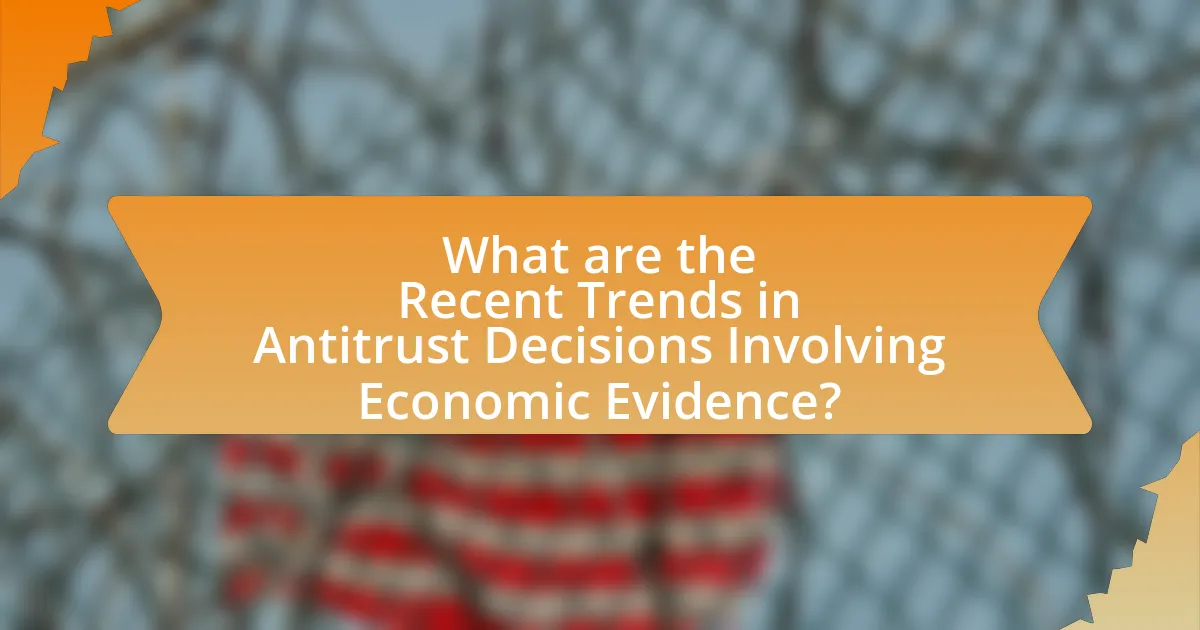The article examines the critical role of economic evidence in recent antitrust decisions, highlighting its importance in assessing market behavior and competitive practices. It discusses how regulators and courts utilize quantitative and qualitative data, such as price elasticity and market share analysis, to evaluate potential anti-competitive effects in cases like U.S. v. Google and the AT&T-Time Warner merger. The article also addresses the methodologies used to assess the reliability of economic evidence, the challenges and limitations associated with its interpretation, and the evolving trends in antitrust enforcement that prioritize data-driven approaches. Additionally, it explores future implications for antitrust law and policy, emphasizing the need for businesses and legal professionals to adapt to these changes.

What is the Role of Economic Evidence in Antitrust Decisions?
Economic evidence plays a crucial role in antitrust decisions by providing quantitative and qualitative data that informs the assessment of market behavior and competitive practices. This evidence helps regulators and courts evaluate whether business practices harm competition or consumer welfare, often through economic models and empirical analysis. For instance, the U.S. Federal Trade Commission and the Department of Justice utilize economic evidence to analyze mergers and acquisitions, assessing potential price increases or reduced innovation that could result from reduced competition. Historical cases, such as the merger between American Airlines and US Airways, demonstrated how economic evidence was pivotal in determining the merger’s impact on market competition, leading to a thorough examination of market shares and pricing strategies.
How has economic evidence influenced recent antitrust rulings?
Economic evidence has significantly influenced recent antitrust rulings by providing a quantitative basis for assessing market behavior and competitive effects. For instance, in the United States v. Google case, economic analyses demonstrated the company’s market dominance and its impact on competition, leading to a ruling that emphasized the importance of data-driven assessments in antitrust enforcement. Additionally, the Federal Trade Commission’s reliance on economic models to evaluate mergers, such as the proposed merger between AT&T and Time Warner, showcased how economic evidence can clarify potential anti-competitive outcomes, ultimately shaping the legal landscape of antitrust decisions.
What types of economic evidence are commonly used in antitrust cases?
Economic evidence commonly used in antitrust cases includes price elasticity of demand, market share analysis, and economic models assessing competitive effects. Price elasticity of demand helps determine how changes in price affect consumer behavior, which is crucial for evaluating potential anti-competitive practices. Market share analysis provides insights into the level of competition within a market, indicating whether a firm holds significant power that could harm competition. Economic models, such as the Herfindahl-Hirschman Index, quantify market concentration and predict the impact of mergers or acquisitions on competition. These types of evidence are essential for courts and regulators to assess the competitive landscape and the potential effects of business practices on consumer welfare.
How do courts evaluate the reliability of economic evidence?
Courts evaluate the reliability of economic evidence by assessing its relevance, methodology, and the qualifications of the expert providing the testimony. The evaluation process involves examining whether the economic evidence is based on sound principles and whether it has been subjected to peer review or accepted in the relevant field. For instance, courts often look for adherence to established economic theories and practices, as well as the use of appropriate data and statistical methods. Additionally, the credibility of the expert witness is scrutinized, including their experience and expertise in the specific area of economics relevant to the case. This rigorous evaluation ensures that the economic evidence presented is both reliable and applicable to the legal issues at hand.
Why is economic evidence critical in antitrust analysis?
Economic evidence is critical in antitrust analysis because it provides a factual basis for assessing market behavior and competitive effects. This evidence helps regulators and courts determine whether business practices harm competition or consumers, as seen in cases like the U.S. v. Microsoft, where economic analysis revealed monopolistic practices that stifled competition. By utilizing quantitative data and economic theories, antitrust authorities can evaluate market structures, pricing strategies, and consumer welfare, ensuring that decisions are grounded in objective analysis rather than subjective opinions.
What role does economic theory play in antitrust evaluations?
Economic theory plays a crucial role in antitrust evaluations by providing a framework for analyzing market behavior and competitive dynamics. It helps regulators assess whether business practices harm competition or consumer welfare, guiding decisions on mergers, monopolistic practices, and price-fixing. For instance, the Chicago School of economic thought emphasizes efficiency and consumer welfare, influencing antitrust policy to focus on actual harm rather than potential risks. Empirical studies, such as those by the American Economic Association, demonstrate that economic models can predict the effects of market concentration on prices and innovation, reinforcing the importance of economic theory in shaping effective antitrust enforcement.
How does economic evidence help in assessing market power?
Economic evidence assists in assessing market power by providing quantitative data and analytical frameworks that reveal the competitive dynamics within a market. This evidence includes metrics such as market shares, pricing behavior, and elasticity of demand, which help determine whether a firm can influence prices or exclude competitors. For instance, the Herfindahl-Hirschman Index (HHI) is a widely used measure that quantifies market concentration, indicating potential market power. Empirical studies have shown that higher HHI values correlate with increased likelihood of anti-competitive behavior, thus reinforcing the validity of economic evidence in antitrust evaluations.

What are the Recent Trends in Antitrust Decisions Involving Economic Evidence?
Recent trends in antitrust decisions involving economic evidence indicate a growing reliance on empirical data and economic analysis to assess market behavior and competitive effects. Courts and regulatory bodies increasingly utilize sophisticated economic models and quantitative evidence to evaluate mergers, monopolistic practices, and anti-competitive behavior, emphasizing the importance of rigorous economic assessments in decision-making. For instance, the Federal Trade Commission has recently focused on the use of economic evidence in cases involving digital markets, highlighting the need for data-driven approaches to understand market dynamics and consumer welfare. This trend reflects a shift towards a more analytical framework in antitrust enforcement, aiming to ensure that decisions are grounded in solid economic reasoning rather than solely on legal precedents or theoretical arguments.
How have recent antitrust cases utilized economic evidence differently?
Recent antitrust cases have utilized economic evidence differently by increasingly relying on empirical data and advanced economic models to assess market dynamics and competitive effects. For instance, in the United States v. Google case, the Department of Justice employed detailed market analysis and economic theories to demonstrate how Google’s practices harm competition, contrasting with earlier cases that often relied on more qualitative assessments. This shift reflects a broader trend where courts and regulators demand rigorous economic analysis, such as econometric studies and consumer welfare assessments, to substantiate claims of anti-competitive behavior, thereby enhancing the evidentiary standards in antitrust litigation.
What landmark cases exemplify the use of economic evidence?
Landmark cases that exemplify the use of economic evidence include United States v. Microsoft Corp. and American Express Co. v. Italian Colors Restaurant. In United States v. Microsoft Corp., economic evidence demonstrated Microsoft’s monopolistic practices in the software market, influencing the court’s decision to impose remedies. Similarly, in American Express Co. v. Italian Colors Restaurant, the Supreme Court analyzed economic evidence regarding anti-steering provisions, which affected competition and consumer choice, ultimately impacting the ruling on arbitration agreements. These cases illustrate how economic evidence plays a critical role in antitrust litigation and judicial outcomes.
How have regulatory agencies adapted their approach to economic evidence?
Regulatory agencies have adapted their approach to economic evidence by increasingly incorporating advanced economic models and empirical data analysis into their decision-making processes. This shift reflects a recognition of the complexity of market dynamics and the need for robust quantitative assessments to inform antitrust evaluations. For instance, agencies like the Federal Trade Commission and the European Commission now utilize sophisticated econometric techniques to analyze market behavior and competitive effects, which enhances the accuracy of their assessments. This evolution is evidenced by the adoption of the “Guidelines for the Assessment of Non-Horizontal Mergers” by the European Commission, which emphasizes the importance of economic evidence in evaluating potential anti-competitive effects.
What challenges arise from the use of economic evidence in antitrust cases?
The challenges arising from the use of economic evidence in antitrust cases include the complexity of accurately interpreting data, the potential for bias in economic models, and the difficulty in establishing causation between economic behavior and anti-competitive effects. Economic evidence often relies on sophisticated statistical analyses that can be misinterpreted or manipulated, leading to erroneous conclusions about market behavior. Additionally, economic models may incorporate assumptions that do not reflect real-world conditions, which can skew results. For instance, the 2018 case of Ohio v. American Express highlighted how economic evidence can be contentious, as differing interpretations of market dynamics led to conflicting expert testimonies. These challenges underscore the need for rigorous scrutiny of economic evidence to ensure fair antitrust enforcement.
What are the limitations of economic evidence in legal contexts?
Economic evidence in legal contexts has limitations primarily due to its reliance on assumptions and models that may not accurately reflect real-world complexities. For instance, economic models often simplify human behavior and market dynamics, which can lead to misleading conclusions in antitrust cases. Additionally, the interpretation of economic data can be subjective, influenced by the biases of experts presenting the evidence. Furthermore, economic evidence may not account for non-economic factors, such as consumer welfare or ethical considerations, which are crucial in legal judgments. These limitations highlight the necessity for a comprehensive approach that integrates both economic and legal perspectives in antitrust decisions.
How do differing interpretations of economic evidence affect outcomes?
Differing interpretations of economic evidence significantly affect outcomes in antitrust decisions by influencing the legal assessments of market power and competitive behavior. For instance, when economic evidence is interpreted to suggest that a merger will enhance competition, regulators may approve it, leading to increased market concentration. Conversely, if the same evidence is viewed as indicative of potential anti-competitive effects, the merger may be blocked, preserving market competition. A notable example is the 2018 AT&T-Time Warner merger, where differing interpretations of economic models regarding vertical integration led to contrasting views on consumer welfare and market dynamics, ultimately resulting in the merger’s approval despite concerns about market power. This illustrates how the interpretation of economic evidence can directly shape regulatory outcomes and market structures.

What Future Implications Does Economic Evidence Have for Antitrust Law?
Economic evidence will increasingly shape antitrust law by providing a more data-driven approach to assessing market behavior and competitive practices. As courts and regulators rely on empirical data to evaluate mergers, monopolistic practices, and anti-competitive behavior, the integration of economic analysis will lead to more informed decisions. For instance, the use of economic models and statistical evidence in cases like the U.S. v. Microsoft has demonstrated how economic insights can clarify the impact of business practices on competition. This trend suggests that future antitrust enforcement will prioritize rigorous economic assessments, potentially leading to more nuanced interpretations of market power and consumer welfare.
How might economic evidence shape future antitrust policies?
Economic evidence will significantly shape future antitrust policies by providing data-driven insights into market dynamics and competitive behavior. For instance, empirical studies demonstrating the effects of mergers on consumer prices can guide regulators in assessing potential anti-competitive outcomes. Historical cases, such as the 2018 AT&T-Time Warner merger, highlighted how economic models predicting price increases influenced the court’s decision, emphasizing the importance of rigorous economic analysis in policy formulation. By integrating quantitative evidence, policymakers can create more effective regulations that promote competition and protect consumers.
What emerging economic theories could influence antitrust decisions?
Emerging economic theories that could influence antitrust decisions include the “New Industrial Organization” theory and “Behavioral Economics.” The New Industrial Organization theory emphasizes the importance of market structures and firm behavior in determining competitive outcomes, suggesting that antitrust analysis should focus on the strategic interactions between firms rather than solely on market shares. Behavioral Economics introduces insights into how consumer behavior and cognitive biases can affect market dynamics, indicating that traditional models may overlook factors that lead to anti-competitive practices. These theories are gaining traction as they provide a more nuanced understanding of competition, which can lead to more informed antitrust enforcement and policy-making.
How can businesses prepare for changes in antitrust enforcement related to economic evidence?
Businesses can prepare for changes in antitrust enforcement related to economic evidence by conducting thorough assessments of their market practices and ensuring compliance with evolving regulations. This involves regularly reviewing pricing strategies, market share, and competitive behavior to align with current antitrust standards. For instance, the Federal Trade Commission and the Department of Justice have increasingly emphasized the importance of economic evidence in their enforcement actions, as seen in cases like the 2020 lawsuit against Facebook, where economic analysis played a crucial role in determining anti-competitive behavior. By proactively engaging with economic experts and legal advisors, businesses can better understand potential risks and adapt their strategies accordingly to mitigate the impact of stricter enforcement.
What best practices should legal professionals follow regarding economic evidence in antitrust cases?
Legal professionals should ensure that economic evidence in antitrust cases is robust, relevant, and clearly presented. This involves using reliable data sources, employing sound economic methodologies, and ensuring that the evidence directly supports the legal arguments being made. For instance, utilizing empirical studies and economic models that have been peer-reviewed can enhance the credibility of the evidence presented. Additionally, legal professionals should be prepared to explain complex economic concepts in a manner that is accessible to judges and juries, as clarity can significantly impact the case’s outcome.



